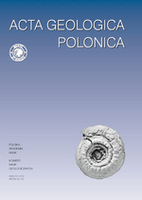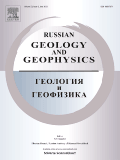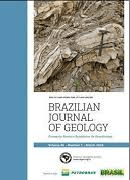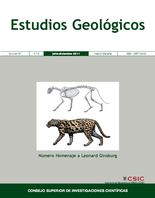
Spisanie Na B Lgarskoto Geologichesko Druzhestov-Review of the Bulgarian Geological Society
Scope & Guideline
Unveiling the complexities of Earth's processes.
Introduction
Aims and Scopes
- Geological Research and Exploration:
The journal publishes studies on various geological formations, mineral deposits, and paleogeographic reconstructions, emphasizing the geological history and resources of Bulgaria. - Environmental Geology and Geohazards:
Research addressing environmental impacts of geological processes, including pollution assessments, landslide studies, and climate change effects on geological stability. - Applied Geosciences and Engineering Geology:
Papers explore practical applications of geology in engineering, including site assessments for construction, hydrogeological modeling, and resource management. - Geochemistry and Mineralogy:
Focus on the chemical composition and properties of geological materials, including studies on mineral associations, geochemical processes, and the implications for resource extraction. - Paleontology and Paleoenvironmental Studies:
The journal includes research on fossil records and paleoenvironmental conditions, contributing to the understanding of historical climate changes and biological evolution. - Geological Education and Public Engagement:
The journal promotes educational initiatives and public awareness of geology, featuring articles on geological excursions, conferences, and notable figures in Bulgarian geology.
Trending and Emerging
- Geochemical Analysis and Environmental Monitoring:
There is a growing emphasis on geochemical studies, particularly in relation to environmental monitoring, pollution assessment, and the impacts of climate change on geological resources. - Geoinformation Technologies and 3D Modeling:
The use of geoinformation technologies, including GIS and 3D geological modeling, has become increasingly prevalent, facilitating advanced analyses and visualizations of geological data. - Sustainable Resource Management:
Emerging research focuses on sustainable practices in resource extraction and management, aligning with global trends towards environmental sustainability and responsible mining. - Hydrogeology and Water Resource Studies:
Research related to hydrogeological conditions, groundwater management, and the impacts of human activities on water resources has gained prominence, reflecting increased concerns over water scarcity and quality. - Interdisciplinary Approaches in Geosciences:
There is a noticeable trend towards interdisciplinary research, integrating geology with fields such as archaeology, environmental science, and engineering to address complex geological challenges.
Declining or Waning
- Traditional Geological Mapping:
There has been a noticeable decrease in publications solely focused on traditional geological mapping techniques, as the field shifts towards more integrated and technology-driven approaches. - Petrology of Common Rock Types:
Research on common rock types and basic petrology has seen a decline, possibly as the field moves towards more specialized studies involving complex mineral deposits and advanced analytical techniques. - Geological History of Lesser-Known Regions:
Papers focusing on the geological history of less prominent regions within Bulgaria have become less frequent, indicating a potential shift towards more significant or economically relevant areas. - Historical Geological Studies:
While historical perspectives are still valuable, there is a waning interest in studies primarily focused on historical geological events without direct application to current geological challenges. - Non-Technical Aspects of Geology:
There seems to be a decrease in articles that discuss geological concepts in a non-technical manner aimed at broader audiences, as the journal increasingly targets a specialized readership.
Similar Journals

ANNALES SOCIETATIS GEOLOGORUM POLONIAE
Unveiling Geological Insights from Poland and the World.ANNALES SOCIETATIS GEOLOGORUM POLONIAE is a distinguished journal published by the Polish Geological Society, focusing on pivotal research in the fields of geology, economic geology, and stratigraphy. With an ISSN of 0208-9068, this journal has established itself as an essential platform for disseminating significant findings and advancements in geological sciences since its convergence in 2008. The journal proudly holds a Q2 quartile ranking in the categories of Economic Geology, Geology, and Stratigraphy as of 2023, indicating its respectable position within the global academic community. Researchers will find its indexed status in Scopus, ranking #138/321 in Geology and showcasing a solid presence in key geological sub-disciplines. While the journal is not open access, it remains a vital resource for professionals and students striving for insight into contemporary geological research. Located in Krakow, Poland, the journal continues to contribute significantly to the understanding of geological processes and resources, making it an indispensable reference for anyone in the field.

ACTA GEOLOGICA POLONICA
Pioneering discoveries in geology and beyond.ACTA GEOLOGICA POLONICA is a distinguished journal published by the Polska Akademia Nauk, in collaboration with the University of Warsaw's Geology Department. Since its inception, it has served as a vital platform for disseminating innovative research in the field of Geology, reflecting a commitment to advancing scientific knowledge in Earth and planetary sciences. With an ISSN of 0001-5709 and an E-ISSN of 2300-1887, this journal provides a rigorous review process and is classified in the Q3 quartile for Geology as of 2023, indicating its growing influence in the discipline. Despite not being open access, the journal facilitates meaningful contributions that span a range of geological topics from fundamental research to applied sciences, thereby enriching the academic landscape. Researchers, professionals, and students alike are encouraged to engage with the valuable findings and discussions contained within its pages, which continue to shape the future of geological inquiry.

Russian Geology and Geophysics
Pioneering Insights in Russian GeosciencesRussian Geology and Geophysics is a seminal journal published by GEOSCIENCEWORLD that plays a pivotal role in the dissemination of vital research within the realms of Earth-Surface Processes, Geology, and Geophysics. With an ISSN of 1068-7971 and an E-ISSN of 1878-030X, this journal has witnessed a continuous evolution since its convergence in 2007 and is poised to thrive through 2024. While it is not an Open Access journal, it is recognized for its significant contributions to the academic community, holding a respectable Q2 ranking in Earth-Surface Processes and Q3 rankings in both Geology and Geophysics as of 2023. The journal’s impact factors align it within competitive quartiles, marking it as an essential resource for researchers and professionals seeking to stay at the forefront of geological and geophysical sciences. By publishing high-quality peer-reviewed articles, the journal fosters an environment of knowledge sharing and innovation, making it indispensable for students, practitioners, and scholars alike who are dedicated to advancing our understanding of Earth's complex systems.

Brazilian Journal of Geology
Illuminating the Earth's Mysteries Through ResearchBrazilian Journal of Geology, the flagship publication of the SOC BRASILEIRA GEOLOGIA, has been a beacon of geoscientific research since its inception in 2013. With an ISSN of 2317-4889 and an E-ISSN of 2317-4692, this open-access journal has facilitated the dissemination of high-quality research across various branches of geosciences, making it freely accessible to a global audience since 2014. Hailing from Brazil, the journal proudly holds a Q2 ranking in Earth and Planetary Sciences as of 2023, and ranks #73 out of 195 in Scopus, indicating its growing impact and relevance in the field. The Brazilian Journal of Geology aims to bridge diverse geological studies with interdisciplinary approaches, promoting the understanding and application of geology in addressing contemporary scientific challenges. As it converges research from 2013 to 2024, the journal not only enriches the academic landscape but also serves as a vital resource for researchers, professionals, and students eager to explore the complexities of the Earth and its processes.

Boletin de Geologia
Innovating Earth Science: Discover, Share, Collaborate.Boletin de Geologia is a prominent open-access journal published by UNIV INDUSTRIAL SANTANDER, dedicated to advancing the field of Earth and Planetary Sciences. Since its transition to open access in 2000, this journal has provided a platform for researchers to disseminate their findings and engage with the global scientific community. With an ISSN of 0120-0283 and an E-ISSN of 2145-8553, it is indexed in Scopus and has secured a notable Q3 ranking in the category of miscellaneous Earth and Planetary Sciences as of 2023, reflecting the impact and relevance of its published articles. The journal's geographical scope, rooted in Colombia, allows it to highlight significant geological research pertinent to the region while also contributing to global discussions. Scholars and practitioners interested in innovative research within this field will find Boletin de Geologia an invaluable resource for unlocking knowledge and fostering collaboration in the geological sciences.

Russian Journal of Pacific Geology
Unveiling the Secrets of the Pacific BasinThe Russian Journal of Pacific Geology is a pivotal resource in the realm of Earth sciences, published by PLEIADES PUBLISHING INC. With an ISSN of 1819-7140 and an E-ISSN of 1819-7159, this journal has established itself as a significant publication for researchers, professionals, and students who explore the intricate geology of the Pacific region. Covering a wide array of topics including Geochemistry, Petrology, Geology, Geophysics, Oceanography, Paleontology, and Stratigraphy, the journal's relevance is underscored by its categorization within Q3 quartile rankings across multiple disciplines in the 2023 metrics. Operating from the United States, its influential publications span from 2007 to 2024, attracting a diverse audience dedicated to advancing the geological sciences. Although not an open access journal, it serves as a valuable repository of knowledge, presenting original research, reviews, and critical discussions that enhance scholarly discourse. The journal is recognized within the global scientific community, addressing significant geological challenges while fostering collaboration and innovation among scholars in the Earth and Planetary Sciences.

NORWEGIAN JOURNAL OF GEOLOGY
Pioneering Research in Geology and Beyond.NORWEGIAN JOURNAL OF GEOLOGY, published by the Geological Society of Norway, stands as a vital resource in the fields of geology, geochemistry, petrology, geophysics, oceanography, and paleontology. Since its transition to an Open Access model in 2015, this journal has significantly expanded its reach, allowing for greater dissemination of cutting-edge research and insights. With an ISSN of 2387-5844 and E-ISSN of 2387-5852, the journal is committed to fostering collaboration and knowledge exchange among the scientific community. The journal's categorization in the Q3 quartile across various Earth and Planetary Sciences fields underscores its status as a reputable publication, offering researchers, professionals, and students alike a platform to share their findings and advancements in geology. Continuing through its converged years from 2015 to 2024, the NORWEGIAN JOURNAL OF GEOLOGY plays a crucial role in enhancing our understanding of Earth's processes and materials, making it an important reference for anyone engaged in geoscientific research.

Swiss Journal of Geosciences
Pioneering Geosciences for a Sustainable FutureSwiss Journal of Geosciences is a prestigious academic journal dedicated to advancing the field of geosciences, published by SPRINGER INTERNATIONAL PUBLISHING AG. Since its inception in 2007, the journal has established itself as a leading platform for disseminating high-quality research findings in various domains related to Earth and planetary sciences, achieving a notable Q1 ranking in Geology as of 2023. With a solid reputation reflected in its Scopus ranking of Rank #72/321, the journal stands in the 77th percentile within its category. Based in Switzerland, the Swiss Journal of Geosciences embraces an open access model, making it easier for researchers, professionals, and students worldwide to access vital geological research without barriers. The journal’s objectives include promoting interdisciplinary research and fostering insights that address both fundamental and applied geoscientific problems, ensuring it remains a crucial resource for those seeking to understand our planet’s dynamics. Engage with pioneering research and contribute to the vibrant community of geoscientists by exploring the impactful articles published within its pages.

STRATIGRAPHY AND GEOLOGICAL CORRELATION
Innovating the Science of Stratigraphy and CorrelationSTRATIGRAPHY AND GEOLOGICAL CORRELATION is a prominent scholarly journal published by PLEIADES PUBLISHING INC, featuring a dedicated focus on the fields of geology, stratigraphy, and paleontology. With ISSN 0869-5938 and E-ISSN 1555-6263, this journal has been disseminating significant research findings since its inception in 1994, continuously contributing to the academic discourse through 2024. Despite not currently offering open access, its relevance is underscored by its Category Quartiles for 2023, where it has established itself as Q3 in Geology and Paleontology, and Q2 in Stratigraphy. STRATIGRAPHY AND GEOLOGICAL CORRELATION ranks #29 out of 55 in Stratigraphy and #186 out of 321 in Geology according to Scopus metrics, positioning it within the competitive landscape of Earth and Planetary Sciences. Researchers, professionals, and students are invited to engage with the journal’s content to deepen their understanding and foster innovation within these critical areas of study.

ESTUDIOS GEOLOGICOS-MADRID
Unlocking the Potential of Geological Research in Madrid.ESTUDIOS GEOLOGICOS-MADRID is a prominent journal in the field of geology, published by the esteemed Consejo Superior de Investigaciones Científicas (CSIC) in Spain. Established in 1976, this Open Access journal has been a vital resource for researchers and professionals since its inception. With an impact factor reflecting its contribution to the Earth and Planetary Sciences community, ESTUDIOS GEOLOGICOS-MADRID currently holds a Q3 category ranking in Geology as of 2023, showcasing its relevance and quality within the discipline. The journal publishes a diverse array of geological studies, ensuring wide-reaching access to significant research findings, thereby promoting collaboration and knowledge sharing. Established as a platform for both foundational research and applied geology, this journal fosters academic growth and contributes to understanding the Earth’s processes. Researchers, professionals, and students are encouraged to explore its extensive archive, which includes publications from 1976 to the present. For more information, visit the journal's editorial office at Editorial CSIC, C/VITRUVIO 8, 28006 MADRID, SPAIN.